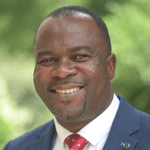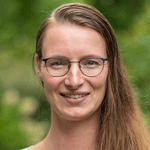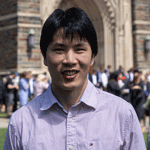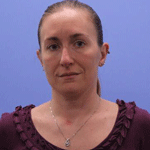The EMS Energy Institute welcomes the following new members who have joined the Institute since our last publication. Detailed profiles can be found at energy.psu.edu.
 Nelson Dzade
Nelson Dzade
Assistant Professor
Dzade is an assistant professor in the John and Willie Leone Family Department of Energy and Mineral Engineering. Prior to joining Penn State, he was the UK’s Engineering and Physical Sciences Research Council (EPSRC) Innovation Research Fellow and independent group leader at the School of Chemistry at Cardiff University. Before that, he was a postdoctoral researcher in the Department of Earth Sciences at Utrecht University. He received his doctoral degree in computational materials science from the University College London. Dzade leads the materials and minerals theory group, which specializes in the development and application of advanced theoretical methods to unravel structure-property-performance relationships in solid-state materials. Often taking place in close collaboration with experiments, his current research emphasizes the development of ab initio methods and harnessing the predictive capacity of first-principles calculations to gain a detailed understanding of the fundamental science needed to rationally design and engineer novel functional materials with unparalleled performance in several renewable energy technologies such as photovoltaics, heterogeneous catalysis, high-capacity batteries, and mineral processing and separation.
 Agathe Eijsink
Agathe Eijsink
Postdoctoral Scholar
Eijsink has a bachelor of science degree in earth sciences and a master of science degree in earth structure and dynamics, both from Utrecht University in the Netherlands. She obtained her doctoral degree from MARUM – Center for Marine Sciences at the University of Bremen, Germany focusing on the spectrum of slow to fast earthquakes. She joined Penn State in June 2022 in Derek Elsworth’s group and the rock mechanics lab, where she performs laboratory frictional sliding experiments to study the relationship between permeability and fault healing at conditions relevant for geothermal reservoirs.
 Ashish Kumar
Ashish Kumar
Assistant Professor
Kumar is an assistant professor in the John and Willie Leone Family Department of Energy and Mineral Engineering. He obtained his master of science degree and doctoral degree in mining engineering from the University of Kentucky. He holds a bachelor of technology degree in mining engineering from the Indian School of Mines. Prior to coming to Penn State, he worked in a large surface greenfield coal mine for three years and led several projects. He is a registered professional engineer in Kentucky. His research broadly focuses on the automation and control of mining systems, aerosol dynamics, and battery safety.
 Kangan Li
Kangan Li
Postdoctoral Scholar
Li joined Yashar Mehmani’s group as a postdoctoral scholar. He received his doctoral degree in computational mechanics from Duke University. His past research focused on an embedded finite element technique called the shifted interface method for simulating problems with complex geometries. Examples include Darcy flow, fluid dynamics, and fracture mechanics. In 2014, he received his bachelor of science degree in mechanical engineering from Shanghai Jiao Tong University in China. His current research focuses on multiscale methods for fracture mechanics of porous materials. He maintains an interest in embedded finite element methods for solid and fluid mechanics.
 Jennifer McKenrick
Jennifer McKenrick
Administrative Assistant
McKenrick joined the Energy Institute in January 2023. Before beginning her current role, she worked in Transportation Services and then moved to HR Data and Onboarding. She holds a bachelor of science degree in business management.
 Pengliang Yu
Pengliang Yu
Postdoctoral Scholar
Yu is a postdoctoral scholar under Christopher Marone and Derek Elsworth. Prior to joining Penn state, he was a research assistant and graduate teaching assistant at the University of Auckland. He received his doctoral degree from the University of Auckland in engineering science. His research focuses on enhanced geothermal systems, induced seismicity, machine learning, numerical reservoir simulation, THM coupling, techno-economic analysis, uncertainty analysis, and experimental design.

